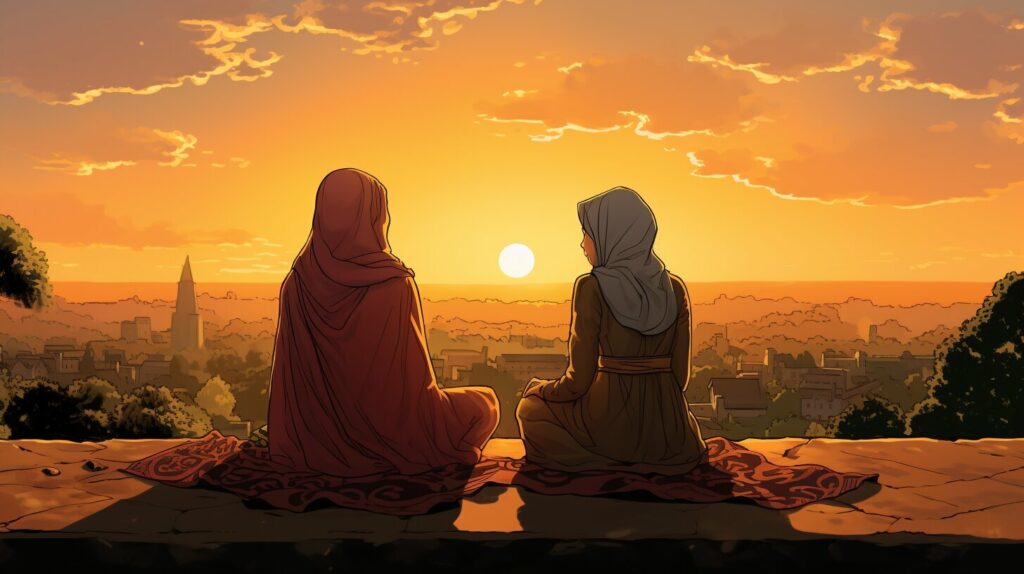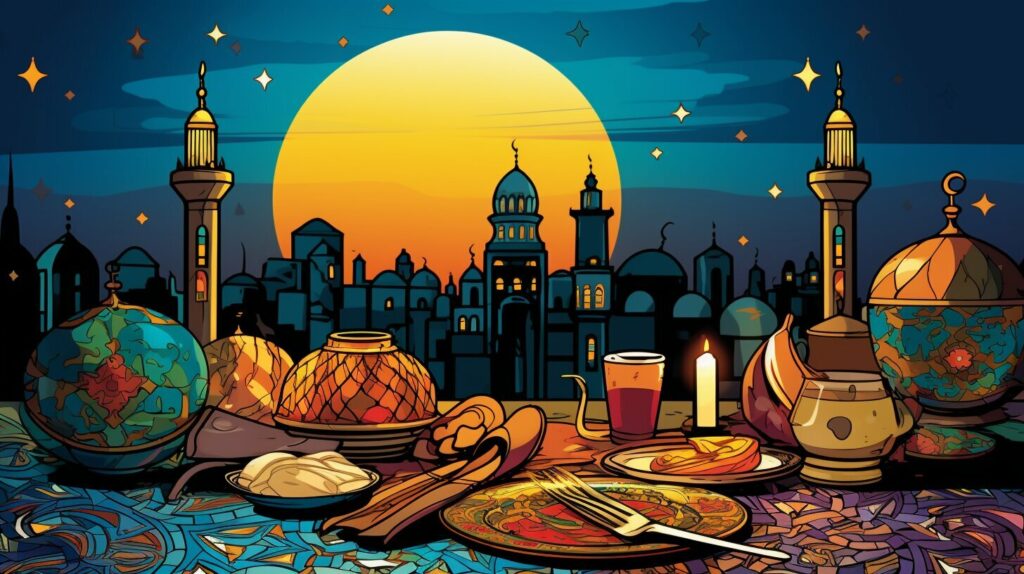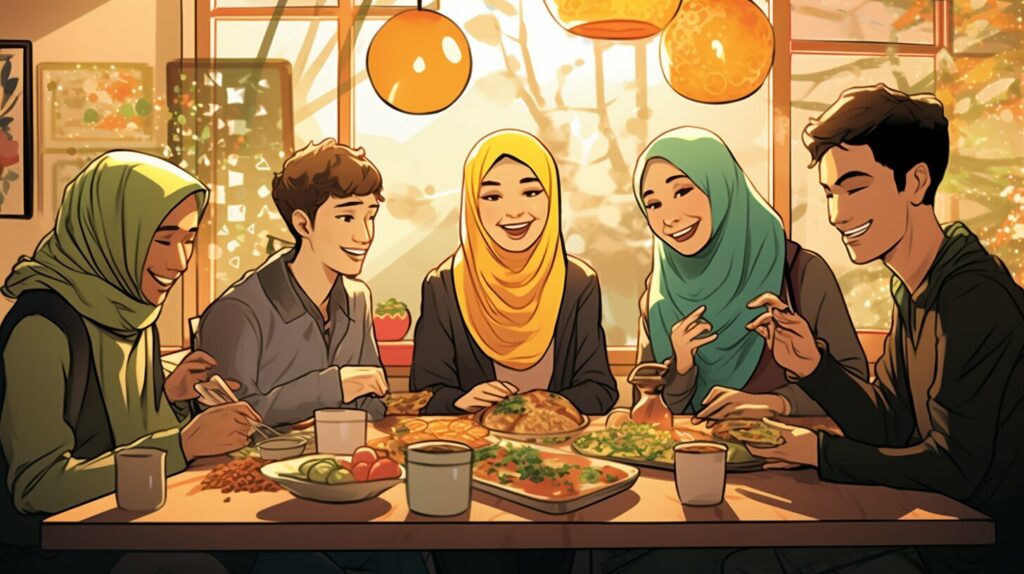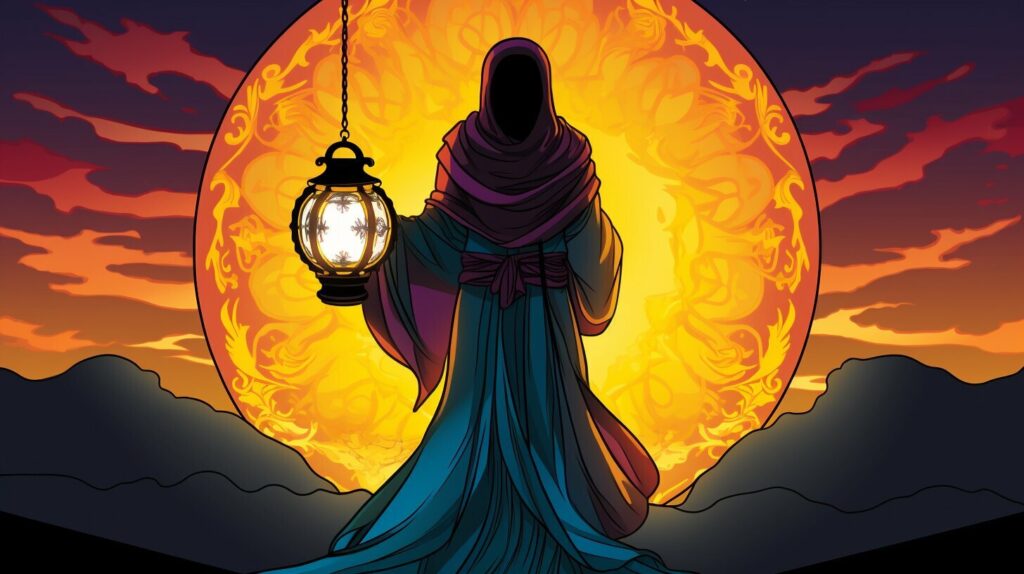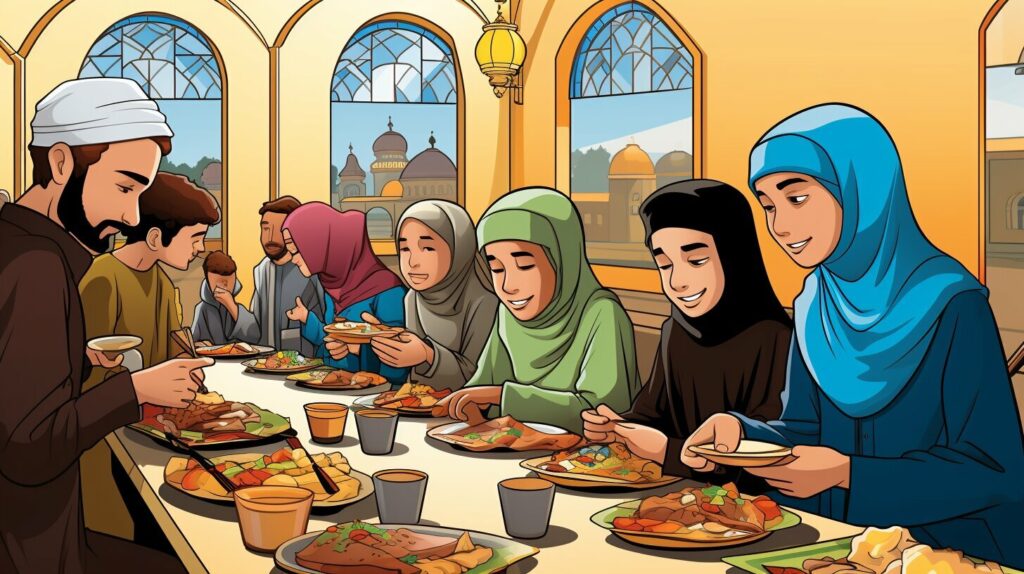
Understanding Ramadan: How to Explain it to a Non-Muslim
Ramadan is the most important holiday of the Islamic faith. It is a month of spiritual focus and renewal, where Muslims fast, pray, and gather as a community. Muslims fast from food and drink, including water, during daylight hours. They also abstain from sexual activity, anger, and immoral acts. Fasting is seen as an act of worship and a way to grow in patience, compassion, and self-control. Muslims are encouraged to pray, do good, and spend time in reflection during Ramadan. They also focus on acts of charity and giving to those in need. Ramadan culminates in Eid Al-Fitr, the Festival of Breaking the Fast.
During Ramadan, Muslim families wake up early before sunrise to have a pre-dawn meal called suhoor. At sunset, they gather to break their fast with the iftar meal, often starting with dates. Muslims also engage in nightly prayers called taraweeh, which foster community and provide an opportunity for worship.
Not all Muslims are required to fast during Ramadan. Children, nursing or expectant mothers, the elderly, the sick, and travelers are exempt. Ramadan is observed worldwide, but the specific customs and traditions may vary depending on the culture. The foods eaten at iftar meals and the timing of breaking the fast can differ among different Muslim communities.
Ramadan is not just about food. It is a time for spiritual reflection, introspection, and increased devotion to Allah. Muslims also focus on being the best version of themselves, refraining from bad habits, and connecting with God. Ramadan is a time for increased charity and giving to the less fortunate. Muslims look forward to the special night of Laylat al-Qadr, believed to be the night when the Quran was first revealed.
Non-Muslims can show support and understanding by acknowledging the start of Ramadan and wishing Muslims “Ramadan Mubarak” or “Ramadan Kareem.” It is important to respect the fasting person’s choice and not to ask personal questions about why they are not fasting in public.
By understanding Ramadan and its significance, non-Muslims can foster connections and bridge the gap between different cultures and religions.
Key Takeaways:
- Ramadan is a month of fasting, prayer, and community gathering for Muslims.
- During Ramadan, Muslims wake up before sunrise for a meal called suhoor and break their fast at sunset with an iftar meal.
- Not all Muslims are required to fast during Ramadan, and customs and traditions may vary among different Muslim communities.
- Ramadan is a time for spiritual reflection, increased devotion to Allah, and acts of charity and giving to the less fortunate.
- Non-Muslims can show support and understanding by acknowledging the start of Ramadan and respecting the fasting person’s choice.
The Basics of Ramadan: Fasting and Abstinence
Muslims fast from food and drink, including water, during daylight hours. They also abstain from sexual activity, anger, and immoral acts. Fasting is seen as an act of worship and a way to grow in patience, compassion, and self-control. Muslims are encouraged to pray, do good, and spend time in reflection during Ramadan. They also focus on acts of charity and giving to those in need.
During Ramadan, Muslim families wake up early before sunrise to have a pre-dawn meal called suhoor. At sunset, they gather to break their fast with the iftar meal, often starting with dates. Muslims also engage in nightly prayers called taraweeh, which foster community and provide an opportunity for worship.
Not all Muslims are required to fast during Ramadan. Children, nursing or expectant mothers, the elderly, the sick, and travelers are exempt. Ramadan is observed worldwide, but the specific customs and traditions may vary depending on the culture. The foods eaten at iftar meals and the timing of breaking the fast can differ among different Muslim communities.
Ramadan is not just about food. It is a time for spiritual reflection, introspection, and increased devotion to Allah. Muslims also focus on being the best version of themselves, refraining from bad habits, and connecting with God. Ramadan is a time for increased charity and giving to the less fortunate. Muslims look forward to the special night of Laylat al-Qadr, believed to be the night when the Quran was first revealed.
Non-Muslims can show support and understanding by acknowledging the start of Ramadan and wishing Muslims “Ramadan Mubarak” or “Ramadan Kareem.” It is important to respect the fasting person’s choice and not to ask personal questions about why they are not fasting in public.
By understanding Ramadan and its significance, non-Muslims can foster connections and bridge the gap between different cultures and religions.
Acts of Worship and Reflection during Ramadan
Muslims are encouraged to pray, do good, and spend time in reflection during Ramadan. This month is an opportunity for spiritual growth and renewal, and devout Muslims strive to increase their devotion to Allah by performing acts of worship.
Aside from performing the obligatory prayers, Muslims may engage in voluntary prayers known as the Taraweeh. These prayers are performed after the last prayer of the day during Ramadan, and they are special because the verses recited are long and complex. Muslims may also take part in reciting the Quran. It is customary to complete its recitation during the month of Ramadan, often by attending a communal reading at the mosque.
Charity and helping others are essential aspects of Ramadan. Muslims are encouraged to give to those in need, and it is common for communities to organize charity events during the month. Some Muslims may even give up the money they would have spent on food during the month to help others.
Reflection is also an integral part of Ramadan. Muslims aim to increase their personal connection with Allah through introspection and self-improvement. Muslims will often reflect on their past deeds and how they can improve themselves in the future. This month is an opportunity for Muslims to reset their focus and grow in their faith.
To introduce Ramadan to non-Muslims, invite them to learn about the various acts of worship and reflection performed during the month. Encourage them to participate in charitable events and to join in communal iftar meals. Be respectful of those who are fasting and avoid consuming food or drink in their presence.
Introducing Ramadan to non-Muslim friends can foster greater understanding and respect, and ultimately, lead to stronger connections between different cultures and religions.
Ramadan Traditions and Culinary Delights
During Ramadan, Muslim families wake up early before sunrise to have a pre-dawn meal called suhoor. This meal helps prepare them for the day ahead of fasting. At sunset, they gather to break their fast with the iftar meal, often starting with dates. Iftar meals can vary from region to region, but often include dishes such as samosas, kebabs, and sweet treats like baklava or syrup-soaked pastries.
Food is not the central focus of Ramadan, but it is an important aspect of the holiday. Sharing meals with family and friends is a way to embrace community and show hospitality. In some cultures, it is common to exchange sweets and dishes during Ramadan as a way of giving to others.
Another important tradition during Ramadan is the act of giving and charity. Muslims are encouraged to give to those in need, whether it be through donations or volunteering their time. In fact, Ramadan is the busiest month for charitable giving in the Muslim community.
Non-Muslims may wonder about the etiquette surrounding food and fasting during Ramadan. It is important to be respectful of those who are fasting and not to eat or drink in front of them during the day. It is also polite to ask before offering food or drinks to someone who is fasting.
Overall, observing Ramadan is a time of spiritual reflection and growth, as well as a time to come together as a community. Sharing meals and giving to others are important traditions during this holiday. By learning about and respecting these customs, non-Muslims can show support and appreciation for their Muslim friends and neighbors.
Diversity and Customization of Ramadan Practices
Not all Muslims are required to fast during Ramadan. Children, nursing or expectant mothers, the elderly, the sick, and travelers are exempt. This exemption recognizes that fasting can have negative health consequences for certain individuals.
Despite this, Ramadan remains a widely observed holiday throughout the Muslim world, and each culture adds its own unique traditions and practices to the holiday. For example, in some parts of the world, a cannon is fired to signal the end of fasting each day, while in others, the call to prayer is used. In some communities, the iftar meal is a small, intimate family gathering, while in others, it is a large, festive celebration with extended family and friends.
The diversity of Ramadan practices reflects the rich cultural heritage of the Muslim world. By understanding and respecting these differences, non-Muslims can gain a deeper appreciation for the holiday and connect with their Muslim neighbors in a meaningful way.
It is important to note that while the practices of Ramadan may differ depending on the culture, the core tenets of the holiday remain the same. Ramadan is a time for spiritual reflection, increased devotion to Allah, and acts of charity and giving to those in need. By learning about these core values, non-Muslims can better understand the holiday and show their support to their Muslim friends and neighbors.
In the next section, we will explore the spiritual significance of Ramadan and its impact on the Muslim community.
The Spiritual Significance of Ramadan
Ramadan is not just about food. It is a time for spiritual reflection, introspection, and increased devotion to Allah. Fasting is an act of worship and a way to grow in patience, compassion, and self-control. By abstaining from food, drink, and other physical desires during the day, Muslims are reminded of the blessings they have and the struggles that others face. It also serves as a reminder to be mindful of one’s actions and words, and to strive towards being a better person.
The increased focus on prayer and reflection during Ramadan is an opportunity for Muslims to strengthen their connection with Allah. It is a time to seek forgiveness and to ask for guidance. Muslims believe that the rewards of good deeds performed during Ramadan are multiplied, making it a particularly auspicious time to do good and to give to charity.
The last ten nights of Ramadan are considered especially holy, with the 27th night, known as Laylat al-Qadr, believed to be the night when the Quran was first revealed. Muslims seek to spend this night in worship and reflection, hoping to gain the blessings associated with it.
Ramadan is a time of increased community and togetherness, with Muslims gathering to pray, break their fasts, and share meals. It is also a time for reaching out to others and strengthening ties with family and friends. Non-Muslims can show support and understanding by acknowledging the significance of this special month and respecting the fasting person’s choice. By fostering connections and building bridges, we can create a more inclusive and accepting society.
Engaging with Ramadan as a Non-Muslim
Non-Muslims can show support and understanding by acknowledging the start of Ramadan and wishing Muslims “Ramadan Mubarak” or “Ramadan Kareem.” Showing interest and asking respectful questions about Ramadan can also be a way to learn about and appreciate the Muslim faith. It is important to approach these conversations with an open mind and a desire to learn.
Non-Muslims can also engage in acts of charity and giving during Ramadan, as these are integral parts of the holiday. Donating to a local food bank or volunteering at a community center can be a great way to show support and build bridges across cultures.
Attending an iftar meal, the breaking of the fast, can also provide an opportunity to experience Ramadan traditions firsthand and connect with Muslim friends or acquaintances. It is important to respect the customs and traditions of the event and to dress modestly out of respect for the host and their faith.
Overall, engaging with Ramadan as a non-Muslim requires an open mind and a willingness to learn and understand. By acknowledging and respecting the practices and beliefs of others, we can build bridges and celebrate the diversity of our communities.
Engaging with Ramadan as a Non-Muslim
By understanding Ramadan and its significance, non-Muslims can foster connections and bridge the gap between different cultures and religions. As someone who is not fasting, you can still participate in Ramadan traditions and support your Muslim friends and colleagues.
One way to engage with Ramadan is to attend iftar dinners or other community events. These gatherings may be hosted at mosques or community centers and are open to people of all faiths. Attending these events can provide an opportunity to learn about Ramadan customs and practices, taste new foods, and connect with Muslims in your community.
Another way to engage with Ramadan is to ask your Muslim friends or colleagues how you can support them during this month. This may include being understanding and flexible with scheduling meetings or events, or offering to help with tasks that may be more difficult during fasting hours.
It is also important to be respectful and mindful of Muslim customs during Ramadan. This may include refraining from eating or drinking in front of someone who is fasting or avoiding scheduling work events during iftar time.
By engaging with Ramadan as a non-Muslim, you can show support and understanding for your Muslim friends and colleagues and help to build bridges between different cultures and religions.
The Spiritual Significance of Ramadan
In conclusion, by understanding Ramadan and its significance, non-Muslims can embrace diversity and build bridges between different cultures and religions. Ramadan is a time for spiritual reflection, increased devotion to Allah, and acts of charity. It is a time for Muslims to connect with God and strive to be the best version of themselves.
Non-Muslims can show support and respect by acknowledging the start of Ramadan and wishing Muslims a blessed month. However, it is important to understand that fasting is a personal choice and not all Muslims are required to fast. Avoid asking personal questions about why someone may not be fasting in public.
By learning about the customs and traditions of Ramadan, non-Muslims can gain a deeper appreciation for the Islamic faith and the diversity of Muslim communities worldwide. Ramadan is a time for breaking down barriers and building connections across cultures and religions. Let us embrace diversity and celebrate the common threads that unite us all.
FAQ
Q: What is Ramadan?
A: Ramadan is the most important holiday of the Islamic faith. It is a month of spiritual focus and renewal, where Muslims fast, pray, and gather as a community.
Q: What do Muslims do during Ramadan?
A: Muslims fast from food and drink, including water, during daylight hours. They also abstain from sexual activity, anger, and immoral acts. Fasting is seen as an act of worship and a way to grow in patience, compassion, and self-control.
Q: Who is exempt from fasting during Ramadan?
A: Children, nursing or expectant mothers, the elderly, the sick, and travelers are exempt from fasting during Ramadan.
Q: What are the nightly prayers called?
A: The nightly prayers during Ramadan are called taraweeh, and they foster community and provide an opportunity for worship.
Q: What is Eid Al-Fitr?
A: Eid Al-Fitr is the Festival of Breaking the Fast, which marks the end of Ramadan. It is a celebration where Muslims come together to pray, share meals, and exchange gifts.
Q: How can non-Muslims show support during Ramadan?
A: Non-Muslims can acknowledge the start of Ramadan and wish Muslims “Ramadan Mubarak” or “Ramadan Kareem.” It is important to respect the fasting person’s choice and not ask personal questions about why they are not fasting in public.
Q: How can non-Muslims learn more about Ramadan?
A: Non-Muslims can educate themselves by reading articles, books, or watching videos about Ramadan. They can also engage in conversations with their Muslim friends, colleagues, or neighbors to learn about their experiences and traditions.
Q: How can understanding Ramadan help bridge the gap between cultures and religions?
A: Understanding Ramadan and its significance can foster connections and promote cultural sensitivity and acceptance. By learning about different religious practices, we can build bridges of understanding and respect.
- Exploring Why Peanut Allergies Are So Common Today - January 18, 2024
- Curious Facts: Why is it Called Bollywood? - January 17, 2024
- Unveiling the Secret: Why is it Called Moonshine? - January 13, 2024
